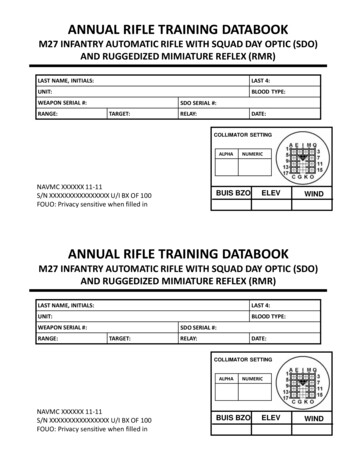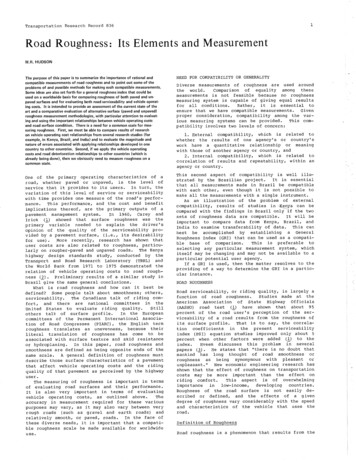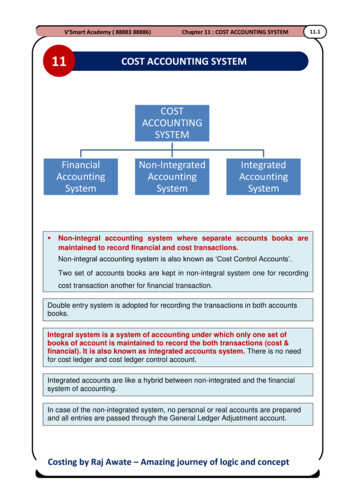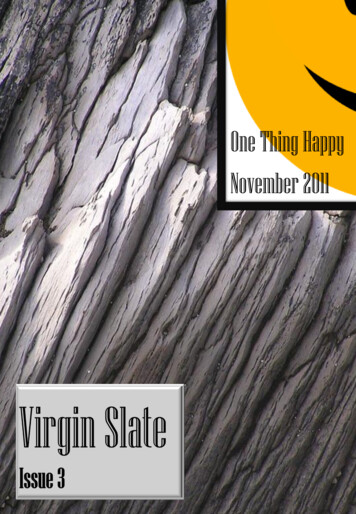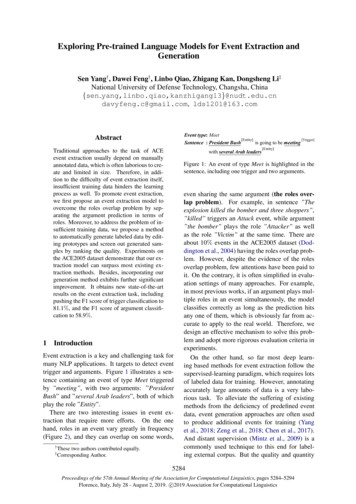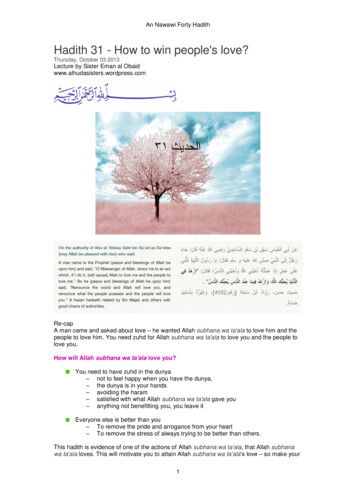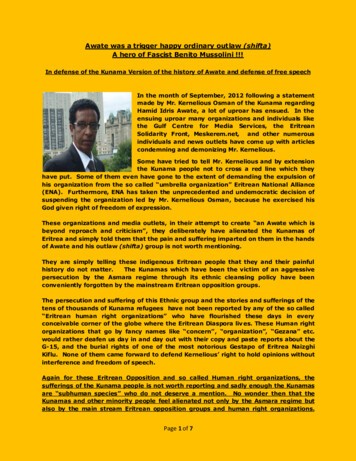
Transcription
Awate was a trigger happy ordinary outlaw (shifta)A hero of Fascist Benito Mussolini !!!In defense of the Kunama Version of the history of Awate and defense of free speechIn the month of September, 2012 following a statementmade by Mr. Kernelious Osman of the Kunama regardingHamid Idris Awate, a lot of uproar has ensued. In theensuing uproar many organizations and individuals likethe Gulf Centre for Media Services, the EritreanSolidarity Front, Meskerem.net, and other numerousindividuals and news outlets have come up with articlescondemning and demonizing Mr. Kernelious.Some have tried to tell Mr. Kernelious and by extensionthe Kunama people not to cross a red line which theyhave put. Some of them even have gone to the extent of demanding the expulsion ofhis organization from the so called “umbrella organization” Eritrean National Alliance(ENA). Furthermore, ENA has taken the unprecedented and undemocratic decision ofsuspending the organization led by Mr. Kernelious Osman, because he exercised hisGod given right of freedom of expression.These organizations and media outlets, in their attempt to create “an Awate which isbeyond reproach and criticism”, they deliberately have alienated the Kunamas ofEritrea and simply told them that the pain and suffering imparted on them in the handsof Awate and his outlaw (shifta) group is not worth mentioning.They are simply telling these indigenous Eritrean people that they and their painfulhistory do not matter.The Kunamas which have been the victim of an aggressivepersecution by the Asmara regime through its ethnic cleansing policy have beenconveniently forgotten by the mainstream Eritrean opposition groups.The persecution and suffering of this Ethnic group and the stories and sufferings of thetens of thousands of Kunama refugees have not been reported by any of the so called“Eritrean human right organizations” who have flourished these days in everyconceivable corner of the globe where the Eritrean Diaspora liv es. These Human rightorganizations that go by fancy names like “concern”, “organization”, “Gezana” etc.would rather deafen us day in and day out with their copy and paste reports about theG-15, and the burial rights of one of the most notorious Gestapo of Eritrea NaizghiKiflu. None of them came forward to defend Kernelious’ right to hold opinions withoutinterference and freedom of speech.Again for these Eritrean Opposition and so called Human right organizations, thesufferings of the Kunama people is not worth reporting and sadly enough the Kunamasare “subhuman species” who do not deserve a mention. No wonder then that theKunamas and other minority people feel alienated not only by the Asmara regime butalso by the main stream Eritrean opposition groups and human right organizations.Page 1 of 7
No wonder that they have incorporated in their programs “the right for selfdetermination up to and including secession”.The Universal Declaration of Human Rights Article 19 clearly states that,Everyone has the right to freedom of opinion and expression; this right includesfreedom to hold opinions without interference and to seek, receive and impartinformation and ideas through any media and regardless of frontiers.The International Covenant on Civil and Political Rights Article 19 also states that,“Everyone shall have the right to hold opinions without interference. Everyone shallhave the right to freedom of expression; this right shall include freedom to seek,receive and impart information and ideas of all kinds, regardless of frontiers, eitherorally, in writing or in print, in the form of art, or through any other media of hischoice.”“To restrict anyone from expressing his views freely about any historical event directlycontradicts the above human right declarations and other similar regional and globallaws pertaining to civil liberties. Freedom of speech and the freedom to express one'sbeliefs are essential to human dignity and liberty and as such Kernelious Osman andthe Kunamas have the right to express their version of the history of Awate withoutanyone censoring, or curtailing them.”Who was Hamid Idris Awate? What was his history? What was his motivation if anywhen he led a band of his outlaws (shifta) to shoot the first bullet against an Ethiopia npolice post?Hamid Idris Awate was born in 1910 in Gersetvillage located between Omhajer and Tesseneiin Gash Setit region of South Western Eritrea,from a Nara father and Beni Amer mother. In1935, he was conscripted by the Italians toserve in the colonial army of the EritreanAscaris. The Italians, impressed by Awate’smilitary performance and loyalty sent him tothe Italian African Police training school inTivoli about 30 km north-east of Rome, for acourse in Military Intelligence.The ItalianAfrican Police force (Polizia dell'Africa Italianaor PAI) was a racially mixed organization,made up of Italian agents and native Ascaris. It was located in police headquarters ofmajor cities like Tripoli, Benghazi, Asmara, Addis Ababa, Mogadishu, Gondar, or insmall commissariats elsewhere.During the fascist era of Benito Mussolini (1922–1943), the Italian African Police(Polizia dell'Africa Italiana or PAI) along with the Carabinieri were one of the policeforces entrusted with suppressing opposition in Italian East Africa (Africa OrientaleItaliana, or AOI), mainly in Eritrea, Somalia and Ethiopia.Page 2 of 7
The other role of Italian African Police (Polizia dell’Africa Italiana) along with theCarabinieri was to set up machine gun posts to control the rear of attacking regimentsand prevent desertion. In the mid to late 1930s, the Italian African Police and theCarabinieri were responsible for the atrocities committed in Eritrea and Ethiopia duringthe Second Italo-Abyssinian War.Recruitment to the Italian African Police was contingent on the degree of loyalty oneshows and the ability to carry on instructions without question. Hamid Idris Awatewas a proud and loyal member of the Italian African Police and Carabinieri whocommitted untold crimes on native Africans (Sudanese, Ethiopians and Eritreans) whowere resisting the occupation of their land by Italy.For his loyal service to the Italian occupation force he was first appointed as securityofficer in western Eritrea and later as deputy chief administrator of the city of Kassala,Sudan and its surroundings during the brief Italian occupation of that city in early1940s. As administrator of Kassala he relentlessly worked to the political union ofKassala to Eritrea until the British attack of January 1941 put an end to his dreams.He further has fought gallantly with his Italian benefactors as a brave soldier in thebattle of Keren.As a loyal fascist soldier, the defeat of Italy by allied forces in East Africa disappointedAwate bitterly. After the British army liberated Eritrea from the Italians in 1941 hecontinued to wage guerilla warfare against the British for over a year, with thecavalrymen of Amedeo Guillet.Amedeo Guillet (February 7, 1909– June 16, 2010) also known as thedevil commander was an officer ofthe Italian Army who commandeda band of cavalrymen "GruppoBande a Cavallo" during the Italianguerrilla war in Ethiopia in yrecruited cavalrymen who wererecruited from all over Ethiopia andEritrea with Yemeni infantry men.They also consisted of some camelcorps from Libya and were led withsix European officers and EritreanNCOs all hand-picked by Amedeohimself.(N. B. The similarity in attire between thepictures of Amedeo Guillet and HamidIdris Awate as cavalrymen)Amedeo Guill etPage 3 of 7
One of these handpicked Non Commissioned Officers (NCOs) was Hamid Idris Awatewho was in charge of 100 Ascari cavalrymen with another Eritrean officer of the Ascarinamed Ali Gabre. Guillet tried to delay the advance of the British Army when theycrossed the Eritrean frontier in 1941. He fought the British army at Cherù on the roadto Amba Alagie and Agordat and his delaying actions enabled the Italian army toregroup at Keren.His actions saved the lives of thousands of Italians and Eritreans who withdrew fromAmba Alagie. After nearly two months the British broke through the defenses of theItalians and Asmara was captured.While most of the Italian army surrendered,Guillet refused to do so and began a private waragainst the British.He continued to wage aguerrilla campaign, ambushing British convoysand disrupting supply lines.For almost a yearGuillet launched guerrilla actions against Britishtroops, plundering convoys and attacking isolatedmilitary posts, with his beautiful gun-totingEthiopian Muslim mistress Kedija by his side. Shewas the daughter of a chieftain from Simien inGondar.In 1942 realizing the futility of hisactions, Guillet managed to escape across the RedSea to Yemen.Kedija – Mistress of Guillet the daughter ofAn Ethiopian Chieftain from Simien, GondarDuring this adventure one of the loyal subjects of Guillet was Hamid Idris Awate whowas fighting for the return of the Duce’s African Empire.It was this guerillaexperience which the ELF wanted to exploit when asking Awate to start the Eritreaninsurrection in 1961.After the departure of Guillet in 1942, Hamid Idris Awate based himself in the westernlowlands of Eritrea in the vicinity of his tribal land with his army of approximately 50men, and continued to fight the British, awaiting for the return of his commanderAmedeo Guillet with help and reinforcement from Rome.He continued his fightagainst the British until 1945. After he realized that the empire of Fascist Italy wasgone for good he continued his outlaw (shifta) life, this time targeting innocentEritrean civilians.He conducted raids into Kunama villages and plundered cattlewhich he sold in the markets of Kassala, Sudan. He se t ablaze countless Kunamavillages and looted them and engaged in indiscriminate killing of Kunama women andchildren including infants.Page 4 of 7
Awate’s notoriety as a shifta and crimes against civilians was such that the thenBritish Military Administration set a price of 300 for information leading to “the arrestor capture of Awate dead or alive”. He was a notorious outlaw (shifta) alongsideother outlaws of the time like Weldegebriel Mosazghi of Berakit Abay and BerheMosazghi of Berakit Abay, Hagos Temnewo of Debri Adi Tsadek and AsresehengeEmbaye of Areza, who were targeting defenseless highlanders of Akeleguzay, Serayeand Hamasien and killed countless Jebertis, Sahos and Kunama of South westernlowlands of Eritrea. A 1949 British Military Administration document enumerates 51such outlaws (shiftas) with a bounty on their heads with Awate at the top of the listand with the highest bounty of 300.He was later pardoned by the British Administration in Eritrea in 1950 and givencomplete amnesty for his past crimes and allowed to return to his hometown. He wasalso allowed to retain his gun for personal protection. The restless and trigger happyAwate was living in his native village when the ELF approached him to start the armedstruggle. He still had some of his band of outlaws with him. He was 50 years old atthe time. Awate accepted the request by the ELF and in September of 1961, fired thefirst shot declaring the start of the armed struggle and was back in business again. Heled the ELF armed wing for only about 20 months and died on May 28, 1962presumably from food poisoning.Thus the so called “Eritrean war of independence”was launched by a criminal outlaw (shifta) and is still run by another outlaw (shifta)Isayas.Hamid Idris Awate was a simple outlaw (shifta). An ordinary soldier entrusted withaccomplishing a political goal charted out for him by ELF leadership in the Sudan. Henever interfered nor tried to influence the political decision of the front, nor did hehave the analyzing capacity of what he was doing. He was politically ignorant and wasglad to do what he was trained to do his whole life and which he knew best how to doi.e. killing and causing mayhem.He was a trigger happy fascist loyalist who worked against the interests of the Eritreanpeople in particular and colonized Africans in General, who continued to fight theBritish forces, alongside Amedeo Guillet, to bring back fascist Italian rule to Eritreaeven after Mussolini’s army had surrendered in East Africa to the allied forces.He was a fascist loyalist who conducted a guerrilla war for 5 whole years for “a king,country and a people whom he never saw or knew”. He was loyal Carabinieri whodiligently worked to keep Eritreans under the yoke of Italian colonialism. As a righthand man of the Italian administration he approved and enforced the racist andoppressive policy of Italy which confiscated around half of the land of Eritrea under theprinciples of state land “Terreno Demaniale”, particularly around western lowlands ofEritrea during his tenure as administrator. He wanted to reinstate the Italian Fascistrule that dehumanized Eritreans using apartheid and segregation and continued tofight to bring back that system to East Africa for five whole years, until the end of theSecond World War.Page 5 of 7
What makes Awate different from the tens of thousands of Eritrean, Ethiopian, andSomali Ascaris who fought alongside Italy is the fact that he conducted a guerilla warto reinstate the fascist rule on Eritrea even after the demise of Duce Mussolini’s empireand even after all the Italian soldiers and Ascaris have surrendered. He was morededicated to fascism than the fascists themselves.He did not even have the slightest concept of freedom let alone be a freedom fighter ora resistance fighter. The only resistance he showed was to resuscitate the deadempire of Benito Mussolini in East Africa.Therefore, Awate does not deserve to be given the honorable title of a freedom fighter.Trying to glamorize and give Awate a face lift and give him a name which he does notdeserve is not only gross representation, but also an insult to his victims.He was a gun, available for hire to the highest bidder, a “Billy the kid” of Eritrea, whoavailed his services first to Benito Mussolini in 1935, next to Amedeo Guillet in 1941out of love and loyalty to fascist Italy and later in 1961 to Idris Mohammed Adem andthe ELF leadership in the Sudan, out of familial and ethnic loyalty.When there was no one to hire him, he turned to cattle raiding and rustling formonetary gains, burning down whole villages indiscriminately, killing and massacringinnocent civilians including infants, children and women. His primary victims were theKunamas. Killing was just a profession for him. That in short is who Hamid IdrisAwate was, no more and no less.The tragic irony is that even though Awate had no noble intention when he fired thefirst shot, he is credited with starting the armed insurrection against the so called"Ethiopian colonizers" because of a historical accident.An interesting and weird twist to the story ofAmedeo Guillet is that he visited Eritrea in 2000upon the express invitation of Isayas Afeworki.Isayas must have taken a few pointers fromItalian rule about how to subjugate the Eritreanpeople. Like father like son, both Isayas andAwate were worshippers of Fascists of DoucheMussolini. The love of Isayas for Guillet came tolight during his visit to Italy in 1999.During his visit to Rome Isayas was askedwhether there was any single Italian he wouldcare to meet. Amedeo Guillet, he replied promptly.The then 90 yrs old Guillet was immediatelysummoned by Italian officials to meet the Eritreanhead of state and was extended an invitation tovisit Eritrea by Isayas, which Guillet did in 2000.Isayas Afeworki welcomes Amedeo to his country.The pr esident’s Palace was very familiar to Amedeo.It used to be the Italian army’s headquarters.Page 6 of 7
We also find another interesting twist to the story of Amedeo Guillet, who died on June16, 2010 at the age of 101. The official website of Amedeo Guillet shows the pictureof an Eritrean Greek by the name of Vassili Kiriakakos at the funeral of Guillet.Vassili Kiriakakos, a Greek Eritrean, and Colonel Mongelli, who made a film documentary about A medeo andwas a devoted attendant during the final years, with Major Ed Jeep, of the US marine c orpsat the funeral of Amedeo Guillet.The name Kiriakakos kind of rings a familiar bell for Eritreans, and raises the questionwhat the role of Eritrean Greeks in general and “the Kiriakakos’’ in particular wasduring the Italian occupation of Eritrea. How come one of the Kiriakakos’ comes topay homage and attend the funeral of a well known Italian soldier of Benito Mussolini?Was there any collaboration by them with the regime of Benito Mussolini in EastAfrica? It makes one wonder. More research needs to be done to know the extent ofthe role of some of the Eritrean Greeks, if there was any, during the fascist era.Ghirmay YeibioWinnipeg, MB.Page 7 of 7
Awate was a trigger happy ordinary outlaw (shifta) A hero of Fascist Benito Mussolini !!! In defense of the Kunama Version of the history of Awate and defense of free speech In the month of September, 2012 following a statement made by Mr. Kernelious Osman of the Kunama regard
